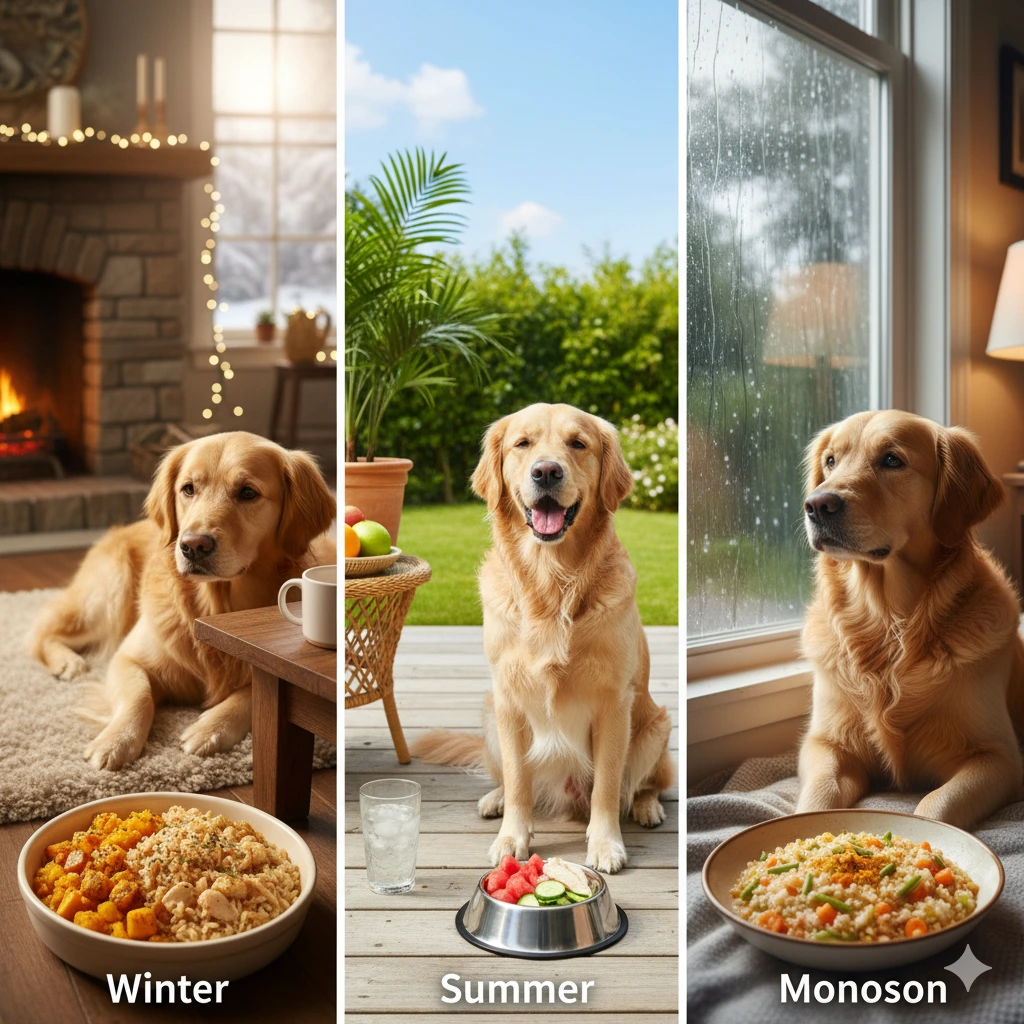Just like humans, dogs thrive when their diet is adapted to the season. Seasonal eating for dogs is an essential practice that ensures your pet remains healthy, energetic, and comfortable all year round. Different weather conditions affect your dog’s metabolism, hydration, and nutritional needs, so feeding the right food at the right time can prevent illnesses and improve overall wellbeing. Whether it’s the cold of winter, the scorching summer heat, or the damp monsoon season, understanding seasonal nutrition is key to keeping your furry friend happy.
Why Seasonal Eating Matters for Dogs
Dogs’ bodies respond to changes in temperature, humidity, and sunlight, just like ours. In winter, they may require more calories to maintain body heat, while in summer, hydration becomes a priority. Monsoon season, with its high humidity and damp conditions, can increase the risk of digestive and skin issues. Adjusting your dog’s diet seasonally ensures they get the nutrients they need, supports immunity, and helps maintain optimal weight and energy levels.
Winter Diet for Dogs
1. Focus on Warm, Nutrient-Dense Meals
During winter, dogs expend more energy to stay warm. Feeding warm and calorie-dense meals helps maintain body temperature and provides the energy they need.
- Include lean meats like chicken, turkey, or mutton, which are excellent protein sources.
- Add carbohydrates like sweet potatoes, rice, or oats to boost energy.
- Include seasonal vegetables such as carrots, pumpkin, and spinach for vitamins and fiber.
2. Support Immune Health
Cold weather often brings sniffles and infections. Incorporate foods rich in antioxidants and vitamins:
- Pumpkin for vitamin A and fiber
- Carrots for beta-carotene
- Spinach for iron and vitamins
Adding a little warm water or broth to meals can also improve palatability and warmth.
3. Avoid Cold, Raw Foods
Feeding raw vegetables or chilled meals during winter can reduce body warmth and digestion efficiency. Stick to lightly steamed or cooked ingredients to keep meals easy to digest.
Summer Diet for Dogs
1. Hydration is Key
Summer brings high temperatures, making hydration a top priority. Ensure your dog has access to fresh water at all times. Include water-rich foods like:
- Cucumber slices
- Watermelon (remove seeds)
- Boiled zucchini
2. Light and Easily Digestible Meals
Dogs’ metabolism may slow slightly in heat, so light, easily digestible meals are better than heavy, oily foods.
- Lean proteins such as chicken or fish
- Steamed vegetables like pumpkin, carrots, and beans
- Small amounts of rice or oats
Avoid fatty meats or fried treats, as they can cause heat-related digestion issues.
3. Cooling Foods and Supplements
Certain natural ingredients help regulate body temperature:
- Yogurt (unsweetened) for probiotics and cooling effect
- Coconut water (unsweetened) for hydration and electrolytes
These foods not only refresh but also support gut health during the hot season.
Monsoon Diet for Dogs
1. Boost Immunity
Monsoon season often brings humidity and dampness, increasing susceptibility to infections and parasites. A diet rich in immunity-boosting nutrients can help:
- Lean meats like chicken or fish for protein
- Vegetables like pumpkin, carrots, and leafy greens for antioxidants
- Fruits like papaya for digestive enzymes
2. Maintain Digestive Health
Humidity can lead to digestive issues such as diarrhea. Feed easy-to-digest, lightly cooked meals to reduce stomach strain. Avoid stale or wet food that may harbor bacteria.
- Include probiotic foods like yogurt or curd
- Use boiled rice or khichdi-style meals to soothe the stomach
3. Prevent Skin Problems
Monsoon can also trigger skin infections due to dampness. Foods rich in omega-3 and omega-6 fatty acids, like fish oil or flaxseed oil, help maintain skin and coat health.
Tips for Seasonal Meal Prep
- Always wash and cook vegetables thoroughly to avoid bacteria during monsoon.
- Adjust meal quantities according to activity level and temperature. Dogs may eat less in summer and more in winter.
- Avoid feeding stale, leftover, or processed foods that can increase the risk of infections.
- Consider Pawma’s Kitchen for convenient, balanced, and seasonally appropriate meals. Their vet-approved recipes are made with fresh ingredients to support digestion, immunity, and overall health.
Signs Your Dog Needs a Seasonal Diet Adjustment
- Changes in energy levels: Lethargy in winter or summer heat fatigue
- Digestive changes: Loose stools or constipation
- Coat condition: Dull or shedding excessively
- Appetite fluctuations: Reduced eating in heat, increased appetite in cold
Observing these signs can help you tweak your dog’s diet to match seasonal needs.
Final Thoughts
Seasonal eating for dogs is more than a trend; it’s a way to ensure your pet thrives all year long. By adjusting meals to meet the demands of winter, summer, and monsoon, you can improve digestion, immunity, energy levels, and coat health. Fresh, wholesome meals, whether home-cooked or from trusted brands like Pawma’s Kitchen, provide the perfect balance of nutrients for your furry friend.
With proper planning and mindful feeding, you can keep your dog healthy, happy, and full of vitality in every season. Paying attention to seasonal dietary needs shows your care and strengthens the bond you share with your beloved pet.



